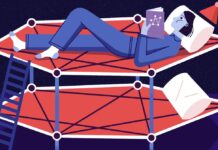What sort of noise would juggling pins make if they fell three stories off a roof onto the pavement below? For a moment, it seems as if the adults and children gathered for the WIRED 25 Festival atop San Francisco’s Commonwealth Club will find out. But Adam Savage, tossing the three blue, white, and silver pins into the air over and over again, keeps his distance from the roof’s edge and his juggling on point.
Savage, the longtime cohost of television’s MythBusters, allowed that his juggling skills have faded since he was 15, when he went pro as a poorly paid entertainer at a poorly regarded amusement park. But his occasional drops were gentle, the pins landing with soft thumps in front of him. No humans were harmed in the making of this talk, during which Savage revealed his secret to getting smart, or at least getting good at something.
First, what getting good at something is not: genius. Savage told the crowd that this concept is one that, after 296 episodes of MythBusters with cohost Jamie Hyneman, he has yet to bust. (The show went off the air in 2016.) “The pernicious myth of greatness, of genius, is a damaging cultural thing, I believe,” he said. “The difficulty of the idea of genius is that it’s fictional. It presupposes that there’s somebody whose brain has the whole thing figured out, and that’s a fiction. That’s a myth.”
Instead, Savage said, getting good at something—juggling, say—is a matter of obsession. Of getting so invested in the idea, you work at it endlessly. The most frustrating thing is that the hardest elements to master can be those that seem simplest. Savage showed off “the box”, a trick in which one of the juggler’s hands throws across as the other tosses up. The result doesn’t look all that impressive, but for Savage, nailing it took time and practice. Mastering chemistry shouldn’t be so different.
In fact, a number of mathematicians and scientists have also become obsessed with juggling, including Claude Shannon, the father of information theory and Richard Ross, who heads up the cephalopods division at the California Academy of Sciences. In the 1980s, a whole passel of mathematicians independently came up with the same method to create and communicate new juggling combinations. It makes sense. Juggling is the stuff of patterns and gravity and precision, good fodder for brains inclined to math and science. But integral to excelling in juggling as well as in science, Savage suggested, is a stick-to-itiveness. An obsessive refusal to stop until you crack that next trick.
“Being a scientist or an engineer is a state of mind, not a state of education,” Savage said. “I placed science in the category of what smart people did, and in doing that I placed myself outside of that category. One of the great realizations of adulthood is that the idiots are equally distributed across everything.”
More Great WIRED Stories








